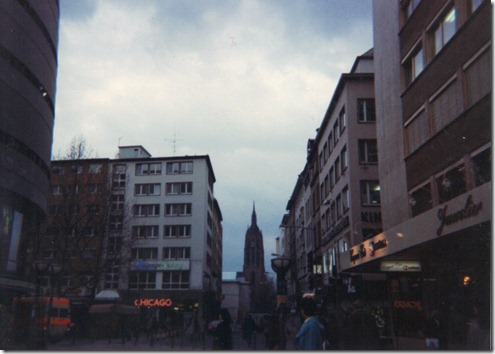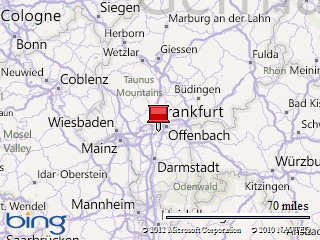This is the third installment of a story chronicling my travels in 1994 as a college student. The six-month journey took me to 20 countries in Europe and Asia.
After a 19-hour journey from the Western United States to Germany (26 counting the 9-hour time difference), I landed without fanfare in Frankfurt. The transoceanic flight, the longest flight I had ever taken, was uneventful and monotonous. I hoped that something, anything, memorable would happen when I reached Frankfurt, although I had no idea what I wanted to transpire. Perhaps some imaginary people could wait for me at the gate to welcome me to Europe or congratulate me for surviving my first long-haul flight, although I thought nothing of the sort would occur after I touched down. I should have been happy to be alive. Not that I was at a major risk of being involved in a plane crash, mind you, but it would have been just my luck for my trip to be cut short by death.
I landed at Frankfurt International Airport (Flughafen) at about 3 a.m. local time. The time difference messed up my internal clock. Even though I arrived at the wee hours of the morning, my head thought it was noontime, and I was wide awake. I knew that I would be worn out long before the end of the day and that inevitably drowsiness would set in sometime after noon. I needed to conserve my strength for the long day ahead and straighten out my days and nights as soon as possible. I was on a new continent and needed to get used to it.
Far from extraordinary, Frankfurt at first glance did not look much different than what I left behind in America. The aircraft landed smoothly and taxied from the runway to a stop on the tarmac far from the terminal building. Except for the German phrases on billboards and runway markings, Frankfurt’s airport seemed like any other. I bid goodbye to my seatmates, disembarked from the plane, walked down the airstair, and hopped on a shuttle bus that took me for a ride to the main terminal. It dumped me off at an entrance, and I went inside without fanfare.
I followed a herd of passengers to Immigration and Customs and waited my turn to flash my passport at an immigration official. He waved me on without a word. Although I didn’t need a visa to enter Germany, I was surprised that he did not make me fill out an entry form. Incredibly, I had more trouble entering Canada, where the Canucks bogged me down with declaration forms and confiscated an apple that I brought from home. (Never mind that the apple grew up in shadow of the Canadian border – disallowed). Passing through German Customs without so much as a cursory baggage check, I made my way to the baggage claim and waited more than 45 minutes for my belongings. There was something to be said about being held up by border control while waiting for bags to arrive.
At the baggage claim, I met a nice Hungarian lady waiting for her luggage named Rosa, who spoke a little German and even less English. I enjoyed talking to her with a mixture of German and hand gestures. The time passed quickly while chatted. Finally, my checked-in baggage spilled on to the conveyer belt and passed twice around the baggage carousel until I collected them. I had two oversized suitcases, a large duffle bag, and a carry-on bag that must have weighed more than 45 kilograms (100 pounds). While I should have grabbed an airport luggage cart, I opted instead to use my own luggage carrier that I bought for my trip. I piled the mound of bags onto it. The thin metal frame designed to accommodate far lighter bags groaned under their weight.
I pulled my poor luggage carrier aside and recounted my plan to travel from Frankfurt to Rosenheim, Germany, a city outside Munich where I would spend the night with a friend. I would depart by subway from the airport to the Hauptbahnhof, Frankfurt’s main train station. I would leave my luggage in a locker at the station and spend the rest of the day exploring the city before taking an evening train to Munich, where I would connect with another train bound for Rosenheim. With this plan in mind, I set off with my overloaded baggage cart and headed for the subway level.
My trip took a turn for the worse when my fragile luggage carrier broke as I tried to pull it into the elevator, spilling my bags on the floor. Embarrassed, I abandoned the elevator to reclaim my luggage. I groaned and pulled them out of the elevator’s path. I squatted next to the pile that had once been my carefully crafted plan and set my most important possessions — my passport, Europass train ticket, traveler’s checks, and plane ticket — on the floor as I contemplated what to do. In my distress, I forgot that I brought along a fanny pack to secure my valuables. Suddenly, I had to figure out how to transport two suitcases, a duffle bag and shoulder bag — virtually my entire life — hundreds of kilometers to Austria. The luggage carrier lay at my feet in a twisted heap. I thought about using an airport baggage cart, but it would only get me as far as the airport subway station. I wished I traveled light, but it was too late to shed all those things I thought I needed but could have done without.
“May I help you?” a voice asked me. I looked up and saw a man standing next to me. He was casually dressed in a t-shirt and jeans with a small shoulder bag. I immediately answered, “Sure, thanks.”
“My name is Francisco. I’m from Venezuela but live here in Frankfurt,” the man said, holding out his hand. I shook it and introduced myself. “Nice to meet you. Thanks for your help.”
Unsure whether he was trustworthy, I scooped up my papers and money and stashed them in my fanny pack. Francisco helped drag my suitcases to a money exchange office, where I changed U.S. dollars into deutschmark (DM), Germany’s currency until it adopted the euro in 1998. Francisco waited patiently for me. As I gathered my belongings to go by myself to the subway, he said, “Look, I’m going that way. Let me give you a hand.”
I appreciated the help and agreed, giving him a suitcase to carry. We took the elevator down to the subway level of the airport. I bought an all-day pass for the Frankfurt subway at a kiosk. Again, Francisco waited for me. We took the train to the Hauptbahnhof. As the train barreled toward the city, the nondescript suburbs passing by in a drab blur, my newfound friend explained that he grew up in Venezuela but came to Frankfurt to study architecture and never left. He spoke excellent English with a Spanish accent. When I asked him how he learned the language, he responded that he needed it to communicate with colleagues and clients from around the world.

I started warming up to Francisco but was still on my guard for suspicious activity. Something about him gnawed at me. Perhaps it was because he was willing to go beyond the call of duty to help a stranger for seemingly nothing in return. I heard stories of tourists who were conned and fell victim to scams — or worse. Nevertheless, I figured that I was relatively safe accompanying him in a high-traffic area of a low-crime city. And his story seemed credible enough. He explained that he had dropped someone off at the airport and was on his way home. He needed to take a train home from the Hauptbahnhof and did not mind accompanying me. He said with pride, “Frankfurters are friendly people who go out of their way to help those in need.”
After we arrived at the main train station, Francisco happened to meet his friend Thomas, a German man with unkempt blond hair who was dressed in fatigues, strange attire for someone living in a European city. Their happenchance meeting seemed to be more than a coincidence. Thomas had a look in his eye that told me he was a streetwise sort. The fatigues made him look as if he were ready for jungle warfare. I could not help but be suspicious of my new acquaintances. I wanted to trust these would-be Good Samaritans but could not get past the nagging feeling that I was being set up. Francisco had one of my suitcases. I had to find a way to get it back and say goodbye before they separated me from my luggage — or worse.
I asked them where I could find the lockers in the train station, hinting that I wanted to go alone. My apprehension turned to distrust when Thomas said, “You have to be careful here, man. The train station is in a bad area of town where a lot of people get robbed. We can help you out.”
Alarm bells went off in my head. I needed to get my belongings and bid them adios as politely as I could, fast.
Click here to read the previous installment of Eurasia.




